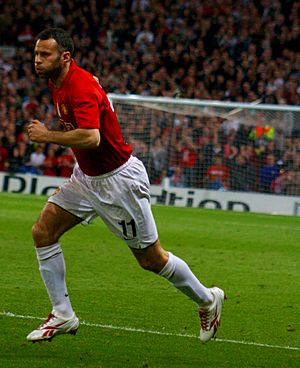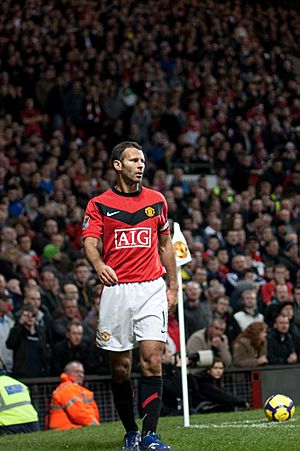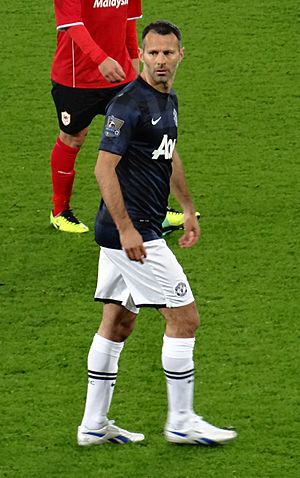Ryan Giggs facts for kids
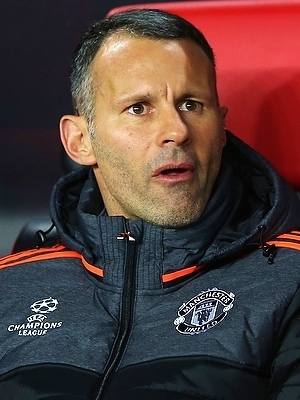
Giggs with Manchester United in 2015
|
|||
| Personal information | |||
|---|---|---|---|
| Full name | Ryan Joseph Giggs | ||
| Birth name | Ryan Joseph Wilson | ||
| Date of birth | 29 November 1973 | ||
| Place of birth | Canton, Cardiff, Wales | ||
| Height | 5 ft 10 in (1.79 m) | ||
| Position(s) | Winger | ||
| Youth career | |||
| Deans FC | |||
| 1985–1987 | Manchester City | ||
| 1987–1990 | Manchester United | ||
| Senior career* | |||
| Years | Team | Apps | (Gls) |
| 1990–2014 | Manchester United | 672 | (114) |
| International career | |||
| 1989 | England U16 | 1 | (1) |
| 1989 | Wales U18 | 3 | (0) |
| 1991 | Wales U21 | 1 | (0) |
| 1991–2007 | Wales | 64 | (12) |
| 2012 | Great Britain | 4 | (1) |
| Managerial career | |||
| 2014 | Manchester United (interim) | ||
| 2014–2016 | Manchester United (assistant) | ||
| 2018–2022 | Wales | ||
| *Club domestic league appearances and goals | |||
Ryan Joseph Giggs (né Wilson; born 29 November 1973) is a Welsh football coach, former player, and co-owner of Salford City. He is known as one of the best players of his time. Many also consider him one of the greatest wingers in football history. Giggs played his entire professional career for Manchester United. He also worked there as a temporary player-manager and assistant manager. He has won many trophies, making him one of the most successful footballers ever. He is also one of only 51 players to have played over 1,000 career games.
Ryan Giggs was born in Cardiff, Wales. His father, Danny Wilson, was a rugby player for Wales. When Ryan was six, his family moved to Manchester because his father joined a new rugby team. Ryan mostly played as a left midfielder. He started his football journey with Manchester City. However, he joined Manchester United on his 14th birthday in 1987. He made his first professional appearance for United in 1991. He then played for the first team for 23 years.
Giggs stopped playing at the end of the 2013–14 season. He holds the club record for most competitive appearances, with 963 games. Towards the end of the 2013–14 season, he became the club's temporary player-manager. This happened after the previous manager, David Moyes, left the club. He then became assistant manager under Louis van Gaal. Giggs left United in July 2016 when José Mourinho became the new manager. During his time at United, he won 13 Premier League titles. This is more than any other player. He also won four FA Cups, three League Cups, two UEFA Champions League titles, and other major trophies. Only Manchester United and Liverpool have won more league championships than Giggs.
For his country, Giggs played 64 times for the Wales national team between 1991 and 2007. He was also the captain of the Great Britain team at the 2012 Summer Olympics. In January 2018, he became the manager of the Wales national team. Giggs helped Wales qualify for UEFA Euro 2020. However, he was unable to manage the team at the tournament, which was delayed due to the COVID-19 pandemic. His assistant manager, Rob Page, took charge instead. Giggs stepped down from his role in June 2022, and Page became the new manager.
Giggs was the first player to win two PFA Young Player of the Year awards in a row (1992 and 1993). He won the PFA Player of the Year award in 2009. He was the only player to play in every one of the first 22 seasons of the Premier League. He was also the only player to score in each of the first 21 seasons. He was chosen for the PFA Team of the Century in 2007. He was also in the Premier League Team of the Decade in 2003. He holds the record for the most assists in Premier League history, with 162. He also has the most assists in UEFA Champions League history with 41. He was named BBC Sports Personality of the Year in 2009. He also received an Officer of the Order of the British Empire (OBE) in 2007 for his contributions to football.
Contents
Early Life and Football Beginnings
Giggs was born in Canton, Cardiff, at St David's Hospital. His parents were Danny Wilson, a rugby player, and Lynne Giggs. Ryan is of mixed heritage; his grandfather on his father's side was from Sierra Leone. He has spoken about facing racism when he was a child. Ryan grew up in Ely, a part of western Cardiff. His younger brother, Rhodri, also played football and managed EFL League Two club Salford City.
Ryan spent a lot of time with his mother's parents. He played football and rugby league on the streets near their house. In 1980, when Ryan was six, his father changed from rugby union to rugby league. He signed with Swinton RLFC, so the family moved to Swinton. This move was hard for Ryan because he was very close to his grandparents. However, he often went back to Cardiff with his family on weekends or school holidays.
After moving to Salford, Giggs played for a local team called Deans FC. Their coach, Dennis Schofield, was a scout for Manchester City. Schofield suggested Giggs to Manchester City, and he joined their School of Excellence. Ryan also played for Salford Boys. They reached the final of the Granada Schools Cup at Anfield in 1987. Giggs was the captain and led his team to victory. He was named man of the match, and Liverpool's chief scout, Ron Yeats, presented him with the trophy. Giggs also played rugby league at school.
While playing for Deans, a local newsagent and Old Trafford stadium worker, Harold Wood, often watched Giggs. Wood spoke to Alex Ferguson, the Manchester United manager. Ferguson sent a scout to watch Giggs. Giggs was offered a trial during Christmas 1986. He played in a match for Salford Boys against a United Under-15s team at The Cliff. He scored three goals, with Ferguson watching. On his 14th birthday, 29 November 1987, Ferguson visited Giggs' house. He offered him a two-year contract as a schoolboy player. They promised he could become a professional player in three years.
Giggs played for England at schoolboy level, captaining the team. He played at Wembley Stadium against Germany in 1989. He changed his last name to his mother's when he was 16. This was two years after his parents separated.
Manchester United Career
Starting Out: 1990–1995
Giggs received his first professional contract on his 17th birthday, 29 November 1990. He signed it and became a professional player two days later. At this time, United had just won the FA Cup. This was their first major trophy since Alex Ferguson became manager.
Giggs made his league debut on 2 March 1991 against Everton at Old Trafford. He came on as a substitute. In his first full start, he scored his first goal in a 1–0 win against Manchester City. He became a regular first-team player in the 1991–92 season. He also captained the youth team, which included many of "Fergie's Fledglings". They won the FA Youth Cup in 1992.
Giggs was the first of many young players from Manchester United's youth system to join the first team under Ferguson. As the youngest player, he looked to older players like Bryan Robson for advice. Giggs won his first trophy on 12 April 1992. United beat Nottingham Forest in the League Cup Final. Giggs set up the only goal of the game. At the end of the season, he was named PFA Young Player of the Year.
By the start of the 1992–93 season, Giggs was United's main left-winger. This was the first season of the new Premier League. He was seen as one of England's best young wingers. Giggs helped United win their first top-division title in 26 years. His rise and the arrival of Eric Cantona helped United become a dominant force in the Premier League. Ferguson protected Giggs, not allowing him to be interviewed until he was 20.
United won the double (Premier League and FA Cup) in the 1993–94 season. Giggs was a key player alongside Cantona, Paul Ince, and Mark Hughes. At the end of the 1993–94 season, Giggs won his second league title. He also became the first player to win two PFA Young Player of the Year awards in a row.
Giggs was known for scoring amazing goals. Many of his goals were nominated for "Goal of the Season" awards. Some of his most famous goals include those against Queens Park Rangers in 1994 and Tottenham in 1994. His solo goal against Arsenal in the 1999 FA Cup semi-final replay is especially famous. He ran from his own half, dribbled past several defenders, and scored with a powerful shot. He famously took off his shirt to celebrate. This was also the last goal ever scored in an FA Cup semi-final replay.
Continued Success: 1995–2005
In the 1994–95 season, Giggs played fewer games due to injury. United did not win any major trophies that season. However, in 1995–96, Giggs was back in top form. He played a crucial part in United winning their second "double" (Premier League and FA Cup). He scored two goals against Southampton in November, helping United keep pressure on Newcastle United. Giggs also played in the FA Cup final win over Liverpool in 1996. By this time, new young players like Gary Neville, Phil Neville, Nicky Butt, David Beckham, and Paul Scholes had joined the team.
The following season, Giggs had a chance to shine in Europe. He helped United win their third league title in four seasons. He also helped them reach the UEFA Champions League semi-finals. This was the first United team in 28 years to do so. However, they lost to Borussia Dortmund.
In 1997–98, Arsenal won the Premier League title instead of United. The next season, 1998–99, Giggs missed many games due to injury. But when he played, he was excellent. He played in both of United's cup finals that season. A memorable moment was his extra-time goal in the FA Cup semi-final against Arsenal. He also scored a 90th-minute equalizer against Juventus in the UEFA Champions League semi-final.
The highlight of the 1998–99 season was when Giggs helped set up the equalizing goal in the 1999 UEFA Champions League Final. This goal helped United win the Treble (Premier League, FA Cup, and Champions League). Giggs was also named Man of the Match when United won the Intercontinental Cup later that year.
Giggs became United's longest-serving player in May 2002. He was a key part of the club, even though he was still in his 20s. United won the Premier League in three of the four seasons after the Treble. In April 2001, he signed a new five-year contract. Giggs celebrated his 10-year anniversary at Old Trafford with a special match against Celtic in 2001. On 23 August 2002, he scored his 100th career goal in a draw with Chelsea.
The 2002–03 season was challenging for Giggs. He had to defend his performance, saying he was not finished. Despite some difficulties, Giggs played one of his most memorable games on 24 February. He came on as a substitute against Juventus and scored two goals in a 3–0 victory.
He won his fourth FA Cup on 22 May 2004. This made him one of only two players to win the trophy four times with Manchester United. He also finished as a runner-up three times. In September 2004, he played his 600th game for United. He was inducted into the English Football Hall of Fame in 2005. In 2005, Giggs' form improved, and he had fewer injuries. He said this was because he started doing yoga.
Later Years and Records: 2005–2014
Giggs signed a two-year contract extension with United. He continued to play well and was mostly free from injuries. He scored his first goal of the 2006–07 season in a 2–1 win over Watford. He also scored the winning goal against Tottenham Hotspur in September. In February 2007, Giggs scored three more goals, including a winning goal against Lille in the UEFA Champions League.
On 6 May 2007, Manchester United became champions of England. Giggs set a new record by winning his ninth league title. This broke the previous record of eight titles. In the 2007 FA Cup Final, a goal by Giggs was disallowed. Giggs played a key role in United's 2007 FA Community Shield victory. He scored in the first half, and United won on penalties. This was Giggs' first professional goal at Wembley Stadium.
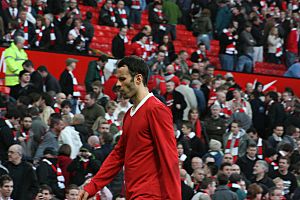
In the 2007–08 season, Alex Ferguson started using Giggs in a rotation system with newer players. Giggs scored his 100th league goal for United against Derby County on 8 December 2007. On 20 February 2008, he made his 100th appearance in the UEFA Champions League. On 11 May 2008, he equaled Bobby Charlton's record of 758 appearances for United. Giggs scored the second goal in that match, helping United win their 10th Premier League title. Ten days later, on 21 May 2008, Giggs broke Charlton's appearance record for United. He came on as a substitute in the 2008 UEFA Champions League Final against Chelsea. United won the final on penalties, and Giggs scored the winning penalty.
At the start of the 2008–09 season, Sir Alex Ferguson began playing Giggs in central midfield. Ferguson said Giggs would be a key player even at 35. Giggs started taking coaching courses. Ferguson hinted that he would like Giggs to join his coaching staff after he retired.
In February 2009, Giggs signed a one-year contract extension. After a successful season, Giggs was nominated for the PFA Players' Player of the Year award. On 26 April 2009, Giggs won the award. This was the first time he had received this award. Giggs made his 800th appearance for Manchester United on 29 April 2009. On 16 May 2009, Manchester United won the Premier League. This was both United's and Giggs' 11th Premier League title.
Giggs scored his first hat-trick for Manchester United in a friendly match. On 12 September 2009, Giggs made his 700th start for United. He scored his 150th goal for United against Wolfsburg. On 28 November 2009, the day before his 36th birthday, Giggs scored his 100th Premier League goal. He became only the 17th player to reach this milestone.
On 30 November 2009, Giggs was offered another one-year contract. This would keep him at the club past his 20th anniversary. On the same day, Giggs won the BBC Sports Personality of the Year award. On 12 December 2009, Giggs passed Gary Speed's record for most Premier League games played by an outfield player. On 18 December 2009, Giggs signed his contract extension. On 31 December 2009, Giggs was named the Manchester United Player of the Decade.
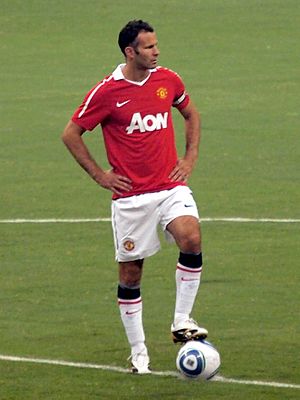
On 24 April 2010, Giggs scored his first league penalties. On 16 August 2010, Giggs continued his record of scoring in every Premier League season. He scored United's third goal in their 3–0 win over Newcastle United. He had now scored in 21 straight top-division seasons. On 17 January 2011, Giggs reached 600 league appearances for Manchester United. Giggs signed a one-year contract extension on 18 February 2011. On 6 March 2011, Giggs passed Bobby Charlton's record for most Manchester United league appearances. On 26 April, against Schalke 04 in the Champions League semi-final, Giggs scored the first goal. He became the oldest goalscorer in Champions League history. Giggs also played in the 2011 UEFA Champions League Final, where United lost to Barcelona.
Giggs made his first start of the 2011–12 season in the UEFA Champions League against Benfica. He scored United's equalizing goal, breaking his own record for the oldest goalscorer in Champions League history. He also became the first player to score in 16 different Champions League campaigns. On 19 November, Giggs played a league game in Wales for the first time. He maintained his record of scoring in each of the past 22 top-flight seasons. On 10 February 2012, Giggs signed another one-year contract extension.
On 26 February 2012, Giggs made his 900th appearance for Manchester United. He scored the winning goal in the 90th minute. After the match, Alex Ferguson said that a player playing 900 games for one club "won't be done again." By March 2011, Giggs had played with over 140 different players for Manchester United.
Giggs scored his first Premier League goal of the 2012–13 season against Everton on 10 February 2013. This extended his goalscoring streak to 23 consecutive seasons in the top division. He signed a new one-year contract on 1 March 2013. On 5 March, Giggs made his 1,000th competitive appearance. This was in a Champions League match against Real Madrid. On 4 July, Giggs was appointed as a player-coach under new manager David Moyes. Giggs became interim player-manager when Moyes left in April 2014.
On 2 October, Giggs became the all-time leading appearance holder in European club competitions. He described this achievement as "special." In November, Giggs celebrated his 40th birthday. Many people praised him for still playing professionally at that age.
Giggs announced his retirement from professional football on 19 May 2014. He posted an open letter to Manchester United fans on the club website. After retiring, Giggs received many compliments for his achievements and his long career.
International Play
Playing for England Schoolboys
Ryan Giggs was born in Cardiff to Welsh parents. He played for Wales at the international level. When he was younger, Giggs was the captain of England Schoolboys. However, he was never able to play for the senior England team. This is because eligibility at the schoolboy level depends on where the school is located. Giggs always said he would choose to play for Wales anyway. He once stated, "I'd rather go through my career without qualifying for a major championship than play for a country where I wasn't born or which my parents didn't have anything to do with."
In his year with the England Schoolboys team, Giggs played nine times, always as captain. They won seven matches and lost two. One of their wins was a 4–0 victory over his Welsh peers. Many of those Welsh players would later play alongside him for the Welsh youth team.
Playing for Wales
In May 1991, Giggs made his debut for the Wales Under-21s. It was a 2–1 victory over Poland. This was his only appearance for the Under-21 team. He was called up to the senior team later that year.
Giggs made his senior international debut against Germany in October 1991. He came on as a substitute and became the youngest player to play for the Welsh senior team. He held this record until June 1998. Wales lost the game 4–1.
Giggs scored his first senior goal for Wales on 31 March 1993. It was in a 3–0 win over Belgium in Cardiff. This was a World Cup qualifying game.
After his debut in 1991, Giggs missed 18 friendly games in a row. He finally played his first friendly for Wales against Finland in March 2000. By then, he had already played 25 competitive games. He often missed friendly matches to avoid injuries. In his autobiography, Giggs explained that playing two games in one week often led to injuries. So, he and Alex Ferguson decided he didn't need to play in friendly international games. However, some people criticized him for often not joining the Wales squads for non-competitive matches.
In a qualifier against England for the 2006 FIFA World Cup, Wales lost 2–0. Giggs played against some of his current and former Manchester United teammates, including David Beckham, Gary Neville, and Wayne Rooney. During a 2006 World Cup qualifier against Azerbaijan on 12 October 2005, Giggs scored two goals in a 2–0 win. However, Wales did not qualify for the play-offs.
In September 2006, he played in a friendly against Brazil. Wales lost 2–0. Brazil's coach, Dunga, praised Giggs' performance. He said Giggs would fit in well with stars like Kaká and Ronaldinho.
Giggs announced his retirement from international football on 30 May 2007. He said he wanted to focus on his Manchester United career. His final game for Wales was against the Czech Republic on 2 June. He was the captain and earned his 64th cap in this game. Wales drew 0–0, and Giggs won the Man of the Match award.
In March 2010, Giggs hinted he might return to international football for Wales' UEFA Euro 2012 qualifying campaign. This was to cover for an injured player. However, he later clarified that he would only return in an emergency.
Playing for Great Britain
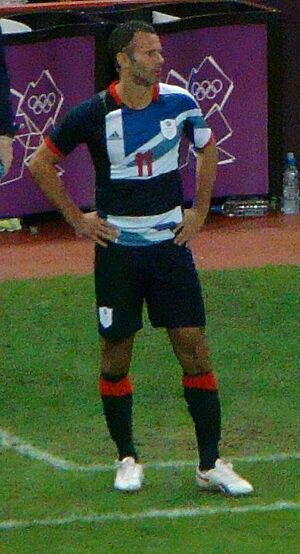
On 28 June 2012, Giggs was chosen as one of three older players for the Great Britain team. They competed at the 2012 Summer Olympics. Craig Bellamy and Micah Richards were the other two. Giggs was named the team captain.
He scored a goal against the United Arab Emirates in a 3–1 win on 29 July. This made him the oldest goalscorer in the Summer Olympics football competition. He was 38 years and 243 days old. He also became the oldest outfield Olympic footballer in that match.
Managerial Roles
Manchester United Coaching
Giggs became a player-coach at Manchester United on 4 July 2013. He joined the coaching staff under new manager David Moyes. When Moyes left on 22 April 2014, Giggs took over as the club's temporary player-manager. He managed four games, winning two, drawing one, and losing one. After his last match in charge, Giggs said he felt emotional due to the pressure of managing United. When Louis van Gaal became the permanent manager on 19 May 2014, Giggs was appointed as his assistant manager.
Giggs was praised for giving young players like James Wilson and Tom Lawrence their first team debuts. Many people, including Louis van Gaal, suggested Giggs could be the next Manchester United manager. However, after José Mourinho was appointed, Giggs announced he was leaving the club on 2 July 2016.
Wales National Team Manager
Giggs was appointed manager of the Wales national team on 15 January 2018. He signed a four-year contract. His first match in charge was a 6–0 win over China. In that game, Gareth Bale broke the all-time scoring record for Wales. Later that year, Wales played in the UEFA Nations League. In 2019, Wales had a slow start to their qualifying group. However, they remained unbeaten for the rest of the year. This led to a 2–0 win over Hungary and qualification for UEFA Euro 2020.
The tournament was delayed due to the COVID-19 pandemic. Giggs was unable to manage the team at the tournament due to personal reasons. His assistant manager, Rob Page, became the temporary manager. Giggs stepped down from his position on 20 June 2022.
Player Style and Discipline
How Ryan Giggs Played
Giggs was a very skilled and energetic left-footed midfielder. He usually played as a traditional left-sided midfielder, taking on defenders. He was also a very flexible player. He could play on either side of the field. He also played in different attacking roles, like an attacking midfielder or even a striker. As he got older and his speed changed, he often played as a defensive or central midfielder. He could also play as a deep-lying playmaker, controlling the game from midfield.
In his best years, his main strengths were his speed, quickness, strength, and excellent dribbling skills. He also had great vision. As his career went on, he improved his crossing and passing. This made him an excellent player for setting up goals. He was known for his tactical smarts, movement, and consistent performance. He was also good at taking free kicks. Besides his football skills, Giggs was also known for his leadership and how long he played at a high level.
Fair Play Record
Giggs was never sent off (given a red card) in his 24-season career for Manchester United. He was only sent off once while playing for Wales. This happened on 5 September 2001 in a World Cup qualifier against Norway. He received a second yellow card in the 86th minute. In November 2003, he was fined for his behavior during a game against Arsenal. In the same week, Giggs received a two-match ban from international football. This was for an incident during a Euro 2004 play-off game.
Personal Life
Family Life
Ryan Giggs is the son of Danny Wilson, a former rugby player for Wales. Ryan was born Ryan Joseph Wilson. As a teenager, he changed his last name to his mother's after his parents separated. People say Giggs got his balance and athleticism from his father. He is a distant cousin of the Barbados international footballer Curtis Hutson.
Giggs married his long-time partner, Stacey Cooke, on 7 September 2007. They had two children, both born in Salford. They lived in Worsley, Greater Manchester, near where Ryan grew up. Giggs and Cooke divorced in 2017. His son Zach Giggs is also a footballer.
Community Work
In August 2006, Giggs became an ambassador for UNICEF UK. This was to recognize his work with Manchester United's 'United for UNICEF' partnership. Giggs visited UNICEF projects in Thailand. He spoke about how important it is to help children.
After Playing Football
In October 2010, Giggs said he would likely finish his career at Old Trafford. He also said he wanted to go into coaching. He described managing Manchester United or Wales as "the two ultimate jobs." He was working on his UEFA 'A' coaching licence.
Gary Neville, a former teammate, planned to use money from his 2011 testimonial match to build a supporters club and hotel near Old Trafford. In 2013, Giggs and Neville started a company called GG Hospitality. They planned to build football-themed hotels and cafés. Their first project was a restaurant called Café Football in Stratford, London, which opened in November 2013. Hotel Football opened later.
In 2014, Giggs and other former Manchester United players bought Salford City. Their goal was to help the club reach the Football League. The group also agreed to sell a 50% share in the club to businessman Peter Lim.
In September 2017, Giggs and other former United teammates suggested creating a university in Greater Manchester. It would be called University Academy 92. It would offer different types of courses to attract students who might not go to traditional universities.
In November 2017, Giggs signed a deal to be a consultant for a Vietnamese football club. He would visit Vietnam twice a year.
Career Statistics
Club
| Club | Season | League | FA Cup | League Cup | Europe | Other | Total | |||||||
|---|---|---|---|---|---|---|---|---|---|---|---|---|---|---|
| Division | Apps | Goals | Apps | Goals | Apps | Goals | Apps | Goals | Apps | Goals | Apps | Goals | ||
| Manchester United | 1990–91 | First Division | 2 | 1 | 0 | 0 | 0 | 0 | 0 | 0 | 0 | 0 | 2 | 1 |
| 1991–92 | First Division | 38 | 4 | 3 | 0 | 8 | 3 | 1 | 0 | 1 | 0 | 51 | 7 | |
| 1992–93 | Premier League | 41 | 9 | 2 | 2 | 2 | 0 | 1 | 0 | – | 46 | 11 | ||
| 1993–94 | Premier League | 38 | 13 | 7 | 1 | 8 | 3 | 4 | 0 | 1 | 0 | 58 | 17 | |
| 1994–95 | Premier League | 29 | 1 | 7 | 1 | 0 | 0 | 3 | 2 | 1 | 0 | 40 | 4 | |
| 1995–96 | Premier League | 33 | 11 | 7 | 1 | 2 | 0 | 2 | 0 | – | 44 | 12 | ||
| 1996–97 | Premier League | 26 | 3 | 3 | 0 | 0 | 0 | 7 | 2 | 1 | 0 | 37 | 5 | |
| 1997–98 | Premier League | 29 | 8 | 2 | 0 | 0 | 0 | 5 | 1 | 1 | 0 | 37 | 9 | |
| 1998–99 | Premier League | 24 | 3 | 6 | 2 | 1 | 0 | 9 | 5 | 1 | 0 | 41 | 10 | |
| 1999–2000 | Premier League | 30 | 6 | – | 0 | 0 | 11 | 1 | 3 | 0 | 44 | 7 | ||
| 2000–01 | Premier League | 31 | 5 | 2 | 0 | 0 | 0 | 11 | 2 | 1 | 0 | 45 | 7 | |
| 2001–02 | Premier League | 25 | 7 | 1 | 0 | 0 | 0 | 13 | 2 | 1 | 0 | 40 | 9 | |
| 2002–03 | Premier League | 36 | 8 | 3 | 2 | 5 | 0 | 15 | 4 | – | 59 | 14 | ||
| 2003–04 | Premier League | 33 | 7 | 5 | 0 | 0 | 0 | 8 | 1 | 1 | 0 | 47 | 8 | |
| 2004–05 | Premier League | 32 | 5 | 4 | 0 | 1 | 1 | 6 | 2 | 1 | 0 | 44 | 8 | |
| 2005–06 | Premier League | 27 | 3 | 2 | 1 | 3 | 0 | 5 | 1 | – | 37 | 5 | ||
| 2006–07 | Premier League | 30 | 4 | 6 | 0 | 0 | 0 | 8 | 2 | – | 44 | 6 | ||
| 2007–08 | Premier League | 31 | 3 | 2 | 0 | 0 | 0 | 9 | 0 | 1 | 1 | 43 | 4 | |
| 2008–09 | Premier League | 28 | 2 | 2 | 0 | 4 | 1 | 11 | 1 | 2 | 0 | 47 | 4 | |
| 2009–10 | Premier League | 25 | 5 | 1 | 0 | 2 | 1 | 3 | 1 | 1 | 0 | 32 | 7 | |
| 2010–11 | Premier League | 25 | 2 | 3 | 1 | 1 | 0 | 8 | 1 | 1 | 0 | 38 | 4 | |
| 2011–12 | Premier League | 25 | 2 | 2 | 0 | 1 | 1 | 5 | 1 | 0 | 0 | 33 | 4 | |
| 2012–13 | Premier League | 22 | 2 | 4 | 1 | 1 | 2 | 5 | 0 | – | 32 | 5 | ||
| 2013–14 | Premier League | 12 | 0 | 0 | 0 | 2 | 0 | 7 | 0 | 1 | 0 | 22 | 0 | |
| Total | 672 | 114 | 74 | 12 | 41 | 12 | 157 | 29 | 19 | 1 | 963 | 168 | ||
International
| National team | Year | Apps | Goals |
|---|---|---|---|
| Wales | 1991 | 2 | 0 |
| 1992 | 3 | 0 | |
| 1993 | 6 | 2 | |
| 1994 | 1 | 1 | |
| 1995 | 3 | 0 | |
| 1996 | 3 | 1 | |
| 1997 | 3 | 1 | |
| 1998 | 1 | 0 | |
| 1999 | 3 | 1 | |
| 2000 | 4 | 1 | |
| 2001 | 5 | 0 | |
| 2002 | 5 | 0 | |
| 2003 | 7 | 1 | |
| 2004 | 3 | 0 | |
| 2005 | 6 | 3 | |
| 2006 | 5 | 0 | |
| 2007 | 4 | 1 | |
| Total | 64 | 12 | |
| Great Britain Olympic team | 2012 | 4 | 1 |
| Total | 4 | 1 | |
- Scores and results list Wales' and Great Britain's goal tally first, score column indicates score after each Giggs goal.
| No. | Date | Venue | Opponent | Score | Result | Competition |
|---|---|---|---|---|---|---|
| Wales goals | ||||||
| 1 | 31 March 1993 | National Stadium, Cardiff, Cardiff, Wales | 1–0 | 2–0 | 1994 FIFA World Cup qualification | |
| 2 | 8 September 1993 | National Stadium, Cardiff, Wales | 1–1 | 2–2 | 1994 FIFA World Cup qualification | |
| 3 | 7 September 1994 | National Stadium, Cardiff, Wales | 2–0 | 2–0 | UEFA Euro 1996 qualification | |
| 4 | 2 June 1996 | San Marino Stadium, Serravalle, San Marino | 4–0 | 5–0 | 1998 FIFA World Cup qualification | |
| 5 | 11 October 1997 | King Baudouin Stadium, Brussels, Belgium | 2–3 | 2–3 | 1998 FIFA World Cup qualification | |
| 6 | 4 September 1999 | Dinamo Stadium, Minsk, Belarus | 2–1 | 2–1 | UEFA Euro 2000 qualification | |
| 7 | 29 March 2000 | Millennium Stadium, Cardiff, Wales | 1–2 | 1–2 | Friendly | |
| 8 | 29 March 2003 | Millennium Stadium, Cardiff, Wales | 4–0 | 4–0 | UEFA Euro 2004 qualification | |
| 9 | 8 October 2005 | Windsor Park, Belfast, Northern Ireland | 3–2 | 3–2 | 2006 FIFA World Cup qualification | |
| 10 | 12 October 2005 | Millennium Stadium, Cardiff, Wales | 1–0 | 2–0 | 2006 FIFA World Cup qualification | |
| 11 | 2–0 | |||||
| 12 | 28 March 2007 | Millennium Stadium, Cardiff, Wales | 1–0 | 3–0 | UEFA Euro 2008 qualification | |
| Great Britain Olympic team goals | ||||||
| 1 | 29 July 2012 | Wembley Stadium, London, United Kingdom | 1–0 | 3–1 | 2012 Summer Olympics | |
Managerial Record
| Team | From | To | Record | |||||
|---|---|---|---|---|---|---|---|---|
| G | W | D | L | Win % | Ref. | |||
| Manchester United (interim) | 22 April 2014 | 11 May 2014 | 4 | 2 | 1 | 1 | 50.00 | |
| Wales | 15 January 2018 | 3 November 2020 | 25 | 12 | 5 | 8 | 48.00 | |
| Total | 29 | 14 | 6 | 9 | 48.28 | |||
Honours and Achievements
Manchester United
- Premier League (13): 1992–93, 1993–94, 1995–96, 1996–97, 1998–99, 1999–2000, 2000–01, 2002–03, 2006–07, 2007–08, 2008–09, 2010–11, 2012–13
- FA Cup (4): 1993–94, 1995–96, 1998–99, 2003–04
- Football League Cup (4): 1991–92, 2005–06, 2008–09, 2009–10
- FA Community Shield (9): 1993, 1994, 1996, 1997, 2003, 2007, 2008, 2010, 2013
- UEFA Champions League (2): 1998–99, 2007–08
- UEFA Super Cup (1): 1991
- Intercontinental Cup (1): 1999
- FIFA Club World Cup (1): 2008
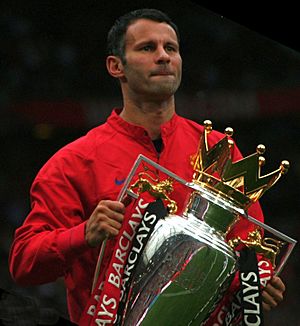
Individual Awards
- Bravo Award: 1993
- PFA Young Player of the Year: 1991–92, 1992–93
- PFA Players' Player of the Year: 2008–09
- PFA Team of the Year: 1992–93 Premier League, 1997–98 Premier League, 2000–01 Premier League, 2001–02 Premier League, 2006–07 Premier League, 2008–09 Premier League
- PFA Team of the Century: 1997–2007
- PFA Merit Award: 2016
- BBC Sports Personality of the Year: 2009
- BBC Wales Sports Personality of the Year: 1996, 2009
- BBC Goal of the Season: 1998–99
- Welsh Footballer of the Year: 1996, 2006
- GQ Sportsman of the Year: 2010
- Sir Matt Busby Player of the Year: 1997–98
- Jimmy Murphy Young Player of the Year: 1990–91, 1991–92
- Manchester United Players' Player of the Year: 2005–06
- Premier League 10 Seasons Awards (1992–93 to 2001–02): Overall Team of the Decade
- Premier League 10 Seasons Awards (1992–93 to 2001–02): Domestic Team of the Decade
- Premier League 20 Seasons Awards (1992–93 to 2011–12): Best Player
- Premier League 20 Seasons Awards (1992–93 to 2011–12): Fantasy Teams of the 20 Seasons public and panel choice
- Premier League 20 Seasons Awards (1992–93 to 2011–12): Most Player Appearances (596)
- Premier League Player of the Month: August 2006, February 2007
- UEFA Champions League 10 Seasons Dream Team (1992 to 2002): 2002
- UEFA Champions League top assist provider: 2006–07
- English Football Hall of Fame Inductee: 2005
- Intercontinental Cup Most Valuable Player of the Match Award: 1999
- Golden Foot: 2011
- Globe Soccer Awards Player Career Award: 2019
- One Club Award: 2020
- FWA Tribute Award: 2007
- IFFHS Legends
Records
- Has won a record 13 top division English league titles as a player, and only Manchester United player to have winner's medals from all 13 Premier League title wins.
- Most Premier League appearances for a player, with 632 (since surpassed by Gareth Barry).
- Most Premier League assists for a player, with 162.
- Most UEFA Champions League assists for a player, with 41.
- Only player to have played in 22 successive Premier League seasons.
- Only player to have scored in 21 successive Premier League seasons.
- First player to have scored in 17 different Champions League tournaments (includes 11 consecutive tournaments, 1996–97 to 2006–07; Lionel Messi and Karim Benzema have a better record with 18)
- Most goals by a British player in the Champions League/European Cup proper history, and 14th overall (not including preliminary rounds).
- Most appearances by a Manchester United player.
- Most starts by a Manchester United player, started in 794 games.
- First player to score 100 Premier League goals for Manchester United.
- Second midfielder to have scored 100 goals in the Premier League for a single club (first being Matt Le Tissier).
- One of four Manchester United players to win two Champions League titles (others are Paul Scholes, Gary Neville and Wes Brown). The only player to play in two winning finals.
- Oldest (37 years, 289 days) player to score in the Champions League, when he scored against Benfica on 14 September 2011.
- One of two Manchester United players to win at least 10 top division medals (the other one is Paul Scholes.)
- Oldest (38 years, 243 days) player to score in the Football competition at the Summer Olympics, when he scored against United Arab Emirates on 29 July 2012.
State and Civic Honours
- OBE for services to football: 2007
- Honorary Master of Arts degree from the University of Salford for contributions to football and charity work in developing countries: 2008
- Freedom of the City of Salford: 7 January 2010. He is the 22nd person to receive the Freedom of the City of Salford.
See also
 In Spanish: Ryan Giggs para niños
In Spanish: Ryan Giggs para niños
- List of footballers with 100 or more UEFA Champions League appearances
- List of men's footballers with the most official appearances
 | John T. Biggers |
 | Thomas Blackshear |
 | Mark Bradford |
 | Beverly Buchanan |


